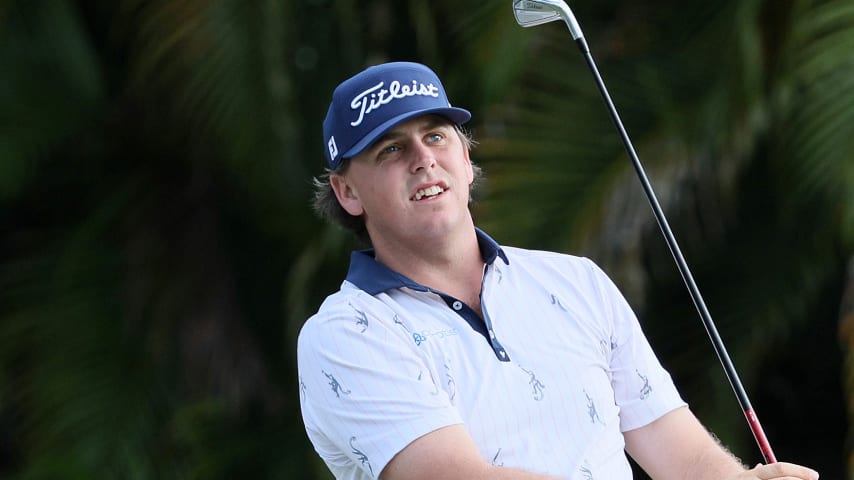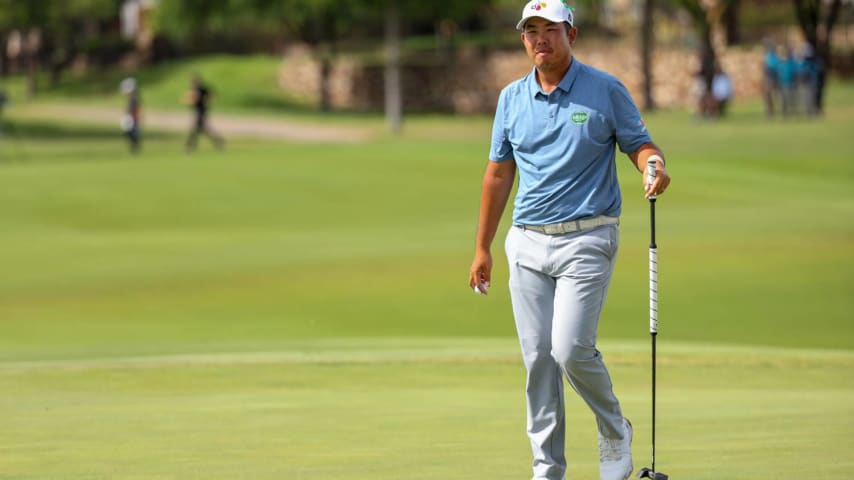The double meaning of Wyndham Clark’s dream year
13 Min Read

Wyndham Clark’s interview after winning Wells Fargo
How the uncanny parallels with caddie John Ellis have made them an unstoppable duo
Written by Cameron Morfit
How the uncanny parallels with caddie John Ellis have made them an unstoppable duo
This week’s Wells Fargo Championship marks one year of Wyndham Clark.
Oh, he’s been on the PGA TOUR longer than that, but for all intents and purposes, it’s been a year. Before he won at Quail Hollow last year, many fans didn’t even know who he was.
Clark earned his first PGA TOUR title at the Wells Fargo, then won the U.S. Open at Los Angeles Country Club a month later. He made the U.S. Ryder Cup team, won another Signature Event at this year’s AT&T Pebble Beach Pro-Am, and finished second to Scottie Scheffler at both the Arnold Palmer Invitational presented by Mastercard and THE PLAYERS Championship. They know who he is now. Over the past 12 months, only Scheffler has been a more prolific performer in big events.
What they don’t know about, not even close, is the story of the man by Clark’s side, his caddie John Ellis, and the haunting echoes of one life in the other.
They walk stride for stride, doing yardages, exchanging clubs, studying the play of the wind in the trees. Clark, who has gone from 80th to third in the world in 12 months, and Ellis are different but the same, eerily so. Had things broken differently … well, they don’t talk about that because there’s no value in it. What’s important is that they respect the divide that connects them.
It’s tempting to call them the man who made it and the man who did not, but that’s not quite right. It’s also too easy, for their relationship is far more complicated than that.
They met at the Punchbowl, the famous putting green at Bandon Dunes, before the Oregon Ducks’ 2016-17 season. Clark, a two-time state champion out of the sports powerhouse Valor Christian High in Denver, had transferred from Oklahoma State, where he had excelled early but struggled since the death of his mother, Lise, of breast cancer in 2013. After two bad years, during which time Mike McGraw, the man who’d recruited him, had been let go, Clark decamped for Oregon, where he’d almost gone in the first place. He had lost his game, he was angry, and he hated who he’d become. He needed a fresh start.
Ellis was driving up from San Jose, California, where he had led Live Oak High School to three state titles. He’d twice been a first-team All-Pac-10 selection at Oregon, and then turned pro. He played in two U.S. Opens, won some state opens and a handful of times in Canada. His best result on the Korn Ferry Tour was 13th, and his best on the PGA TOUR was a T24. It was not what he or anyone else had envisioned. He was tired and frustrated, and when an assistant coaching gig opened up at Oregon, he jumped on it. He needed a fresh start.
Why do we get the teachers we get? And why do we get them exactly when we need them most?
“I feel like John was meant to be my caddie,” Clark said at the U.S. Open last summer.

Wyndham Clark on his accomplishments over past year
He might be right, for the paths of one of the most potent tandems on the PGA TOUR were circuitous, to say the least. Their paths were similar, though, too, each an incandescent talent with furious ambition, each soldiering on through the inevitable bad breaks and worse.
Lise Clark was a former Miss New Mexico who became a national sales director at Mary Kay, replete with pink Cadillac (Wyndham once drove it to prom). She made a mean brisket and could beat all the kids at table tennis; Randall Clark, Wyndham’s father, used to go downstairs and find dents in the table, courtesy of the boys’ tempers. Mom had won again.
Wyndham has said he got his fieriness from his father, who played tennis at Arizona before a brief pro career that was cut short by injuries. But there’s fiery, and then there’s fiery. Wyndham was 13 years old and at an AJGA tournament in Aspen, Colorado, when he threw such a fit that his father shut it down on the spot. The boy was made to shake hands with the other kids before walking in and apologizing to the tournament director. That temper wasn’t done with him yet.
Although his parents loomed large, they were also a loving presence who drove Wyndham to tournaments and kept him supplied with gear, with Lise leaving the kids affirming notes. She was the first to take him to the course when he was 3, and he was hooked at the first bucket of balls. She called him “Winner,” a moniker and something to aim for.
The middle of three siblings – two boys and a girl – Wyndham was 19 when his world was turned upside-down. Lise’s breast cancer had returned after a 14-year remission. He was in between his freshman and sophomore years at Oklahoma State and playing the Western Amateur when told he should fly home. He did, and she died less than a day later.
“Play big,” she told him when she was sick. “Play for something bigger than yourself.”
Clark, after his mother’s passing, tried to live into her words. Play big. Inspire. Be a role model.
Athletics had always been a way to do that. At sports powerhouse Valor Christian, he had played basketball alongside teammate Christian McCaffrey, now a Pro Bowl running back with the San Francisco 49ers. But Clark would forge his identity through golf, for nobody played like him.
While playing for Oregon, Ellis befriended Casey Martin, who was born and raised in Eugene before playing the PGA TOUR. Martin liked that Ellis could beat him. Over time, Martin would leave the TOUR to take over as Oregon’s head coach. He kept up with Ellis, who had some success but soon was struggling as a pro. When Martin lost his top assistant in Eugene, he knew who to call.
Looking around windswept Bandon Dunes, Ellis was excited to rejoin the Oregon program, and intrigued by the hotshot transfer from Oklahoma State, Clark.
“I told him Wyndham’s story,” Martin said. “I said, ‘Look, you’re going to be spending a lot of time with this guy, because I think you can help him.’
“Everybody loves John,” Martin continued. “He’s got a great personality; he’s super fun, he’s super funny, but not like a clown. He connected with the team. They knew he was a great player, but he could make them laugh. He made Wyndham laugh.”
To understand Ellis, who like Clark is one of three siblings – also two boys and a girl – you must know he is the son of Dave Ellis, once the beloved radio voice of San Jose State football. Dave quarterbacked the team to a 13-12 win over Rose Bowl-bound Stanford in 1971 (but would have been the first to point out that the Stanford kicker missed five field goals and an extra point).
Asked about his father, John Ellis said, “He joked that he threw four touchdowns in one game – two to his team, and two to the other team.”
Martin laughed at this bit of Dave Ellis lore.
“That sounds like something John would say,” Martin said.
Although his father was larger than life, John, who like Wyndham played high school basketball, would also forge his own identity through golf, for nobody played the game like him. He grew up on a golf course and sharpened his game by competing against his brother. Word spread.

Wyndham Clark describes his pre-round routine
“The coach before me at Oregon was Steve Nosler,” Martin said. “Nos would tell me about this player from San Jose whom he loved. He was really good.”
Peggy Ellis, John’s mom, was the rock of the family, especially when things got tough.
John was 18 when his world was turned upside-down. Dave Ellis, when he wasn’t doing color commentary for San Jose State football, was a community college teacher who had started a program for disabled students. He was 49 and teaching a physical education class when he felt his chest seize up. The San Francisco Chronicle detailed what happened next:
“I had all the classic symptoms,” Dave Ellis said. “I said, ‘Uh-oh.’ But I still finished the class. I know it sounds dumb, but people who know me aren’t surprised.”
He also went through with his plans to watch John and his brother, Chris, play a golf tournament in nearby Hollister. Only then did he drive himself to the hospital, where he was told he had in fact suffered a heart attack. After getting angioplasty, he figured he might as well get the lump on his head checked out, since Peggy was always on him about it.
Although he had thought he just had a lumpy skull, which he covered with baseball caps, he was told a massive tumor was pressing on his brain. A surgeon removed it in a two-phased operation that totaled 23 hours, after which Dave Ellis spent six days in a coma and had to relearn how to walk and talk again. He would joke that the non-cancerous tumor had room to grow because he had such a little brain, and while he had to miss the Spartans’ 1998 football season, he told the Chronicle that he planned to say, upon his return, “Hello, everyone. This is Dave Ellis, back at Spartan Stadium – a little brain damage, but we’ll be OK.”
Admirable pluck, considering the circumstances were not at all funny. His family did not know if he would survive, and when he came out of the coma, he didn’t recognize them.
“You’d look at him,” John said, “and he’d give you this stare, like, 'Who are you guys?' He had to relearn who we were. It took a few weeks. It made walking and balance hard for him; he battled through so much and taught us to never give up. It gave me perspective about what mattered.”
Dave Ellis would relearn the names of not just his family members but also the Spartans as he returned to call the 1999 season. He would live another 23 years, passing in 2021.
No one aside from his immediate family can know what Clark went through with the death of his mother, but John Ellis can imagine it perhaps more vividly than most.
“I don’t know what would have happened to me, losing my dad,” he said. “With Wyndham, you’re in college …” His voice trailed off. “You have to grow up so fast.”
From the Punchbowl putting green at Bandon, Clark and Ellis were off and running.
“They got along so well it was fun to watch,” Martin said. He laughed. “Unfortunately for me, it worked out a little too well.” (Ellis would go with Clark when the latter turned pro in 2017.)
“He was a softspoken, very polite kid,” Ellis said of Clark. “He had a passion to be successful. Driven. You don’t normally see that in college kids. It looked like he had a chip on his shoulder, and he plays with a chip on his shoulder. I know some things happened at Oklahoma State and he wanted to prove he was one of the best players. He took a very pro approach.
“He had a routine, and drills to get ready,” Ellis continued. “In college golf you pile out of the car and go to the tee, but he was more optimized than the average college kid. We would do drills and compete, and when practice was over, it wasn’t over for him.”
Clark won the Pac-12 Conference championship, was named a first-team All-American, and had ascended to the top of the amateur rankings by the time he turned pro. He and Ellis promptly got through Q School and onto the Korn Ferry Tour, and off that circuit and onto the PGA TOUR.
And that’s when Clark nearly stalled out as Ellis had years earlier.
Rage issues were holding him back, and no one could see it more clearly than Ellis, who didn’t have to think back too far to a time when his career, too, had been derailed. Clark was angry over the loss of his mother, and it fed into his bad golf, which only made him angrier.
It all came to a head at the 2020 Rocket Mortgage Classic in Detroit, where Clark stormed off the course mid-round as Ellis and Boyd Summerhays, his coach at the time, trailed at a safe distance and talked in a low murmur, no doubt aghast. It was a long walk to the clubhouse.
There was, for a time, some question about what to do. Ellis, too, had sometimes played angry and he didn’t want Clark to have to face the same regrets that he had, knowing that his mental struggles, which he admits he should have addressed, held back his physical skills.
“When you look at John’s life and his story, there’s obviously some disappointment,” Martin said. “But maybe some of those disappointments have helped Wyndham. It’s humbling because it’s not about John anymore, but that can be rewarding, too. He’s found his niche; he’s really talented at it, and it’s fun to watch them work together. … Whether they stay together forever or not, you can’t separate Wyndham’s success from John.”
Ellis and Clark’s agent, Rob Mougey, strongly suggested he see sports psychologist Julie Elion. What followed, Clark insisting he’d already tried that, then relenting, became one of the biggest stories of last season. He read the books – “The Obstacle is the Way” by Ryan Holiday, “The Energy Bus” by Jon Gordon – and delved into meditation. He did the work.
“It was like, ‘Hey, buddy, this is rock bottom,’” Ellis said. “‘You have to give this a chance.’ It’s hard as athletes, as men, to deal with some of that stuff.”
Lise Clark would have loved to see Wyndham’s rise. Dave Ellis, too. Clark is playing big. John Ellis is the bag-toting quarterback who knows how and when to toss off a zinger to lighten the mood. They respect that some universal intelligence, maybe God, or cosmic dust, put them in each other’s paths for a reason. Each has been both teacher and student.
When Clark turned pro in 2017, Ellis agreed to be his caddie with the proviso that Clark had to win at Pebble Beach, which was so proximate to San Jose as to be a part of his golfing soul. When Ellis Monday-qualified for the 2004 AT&T Pebble Beach Pro-Am, his father and grandfather were in tears. This year Clark did win, shooting a course-record 60 in the third (which became the final) round to fulfill his caddie’s wish.
The man who made it and the man who didn’t – that divide, once everything, seemed to dissolve in the pelting rain. Whether you believe Ellis didn’t make it so Clark could, or Clark made it so Ellis could, or both, or neither, it doesn’t really matter. On this day, in this golfing Eden with the waves crashing upon the 18th hole, they’d both made it.












